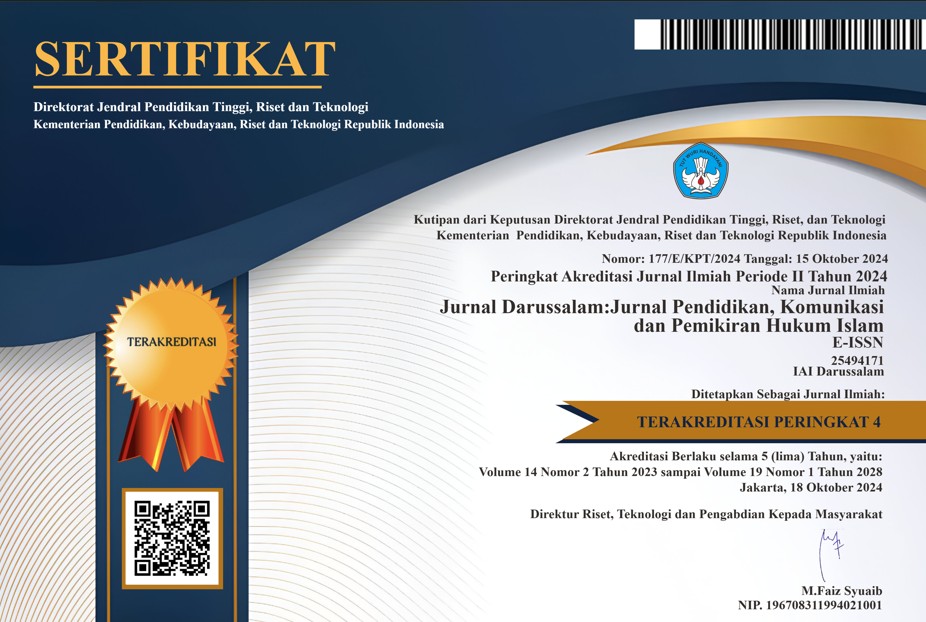Mengungkap Permasalahan Pembiayaan Sistem Bagi Hasil dan Islamisasi Teori Keagenan
DOI:
https://doi.org/10.30739/darussalam.v11i2.817Keywords:
Musharaka, Mudharabah, Ethics, Business, IslamAbstract
This study aims to reveal the problem of the profit-sharing system and the solution to the problem. This research uses a qualitative approach and a kasyif analysis. A qualitative approach is used to reveal empirically to find solutions to the problem of profit-sharing system financing. Meanwhile, the kasyif approach is used to analyze the problems and financing solutions for the profit-sharing system based on the perspective of Islamic law. This study uses a case of implementation of profit-sharing systems in Islamic banking. The results of the study concluded that it is necessary to internalize the values ​​of sharia (Islamic sharia ethics) in agency theory or it is necessary to reconstruct agency theory into "sharia agency theory" so that it is more appropriate in explaining agency problems in the production sharing system financing contract.
Downloads
References
Chariri, Anis, 2008. Questioning The Popularity of Agency Theory in Accounting Research. Jurnal Ekonomi dan Bisnis: 16(1) :1-14. Semarang: Undip.
Cooper, David J and Michael J. Sherer, 1984. The Value of Corporate Accounting Reports: Arguments for a Political Economy of Accounting. Journal of Accounting, Organizations and Society 9: 207-232. USA: University of East Anglia.
Jensen, Michael C and William Meckling H, 1976. Theory of the Firm: Managerial Behavior, Agency Costs and Ownership Structure. Journal of Financial Economics 3(4):305-360. Harvard Business School.
Karim, Adiwarman, 2004(a). Bank Islam: Analisis Fiqih dan Keuangan. Edisi Kedua, Jakarta: PT. Raja Grafindo Persada.
Muhammad, 2004.Upaya Meminimalisasi Asymmetrict Information Dalam Kontrak Mudharabah. Prosiding Simposium Nasional Sistem Ekonomi Islam II :177-189.Malang: Unibraw.
MUI.2017. DSN-MUI No: 115/DSN-MUI/1X/2017 tentang Akad Mudharabah
MUI.2017. DSN-MUI No: 116/DSN-MUI/1X/2017 tentang Akad Syirkah/Musyarakah
Mulawarman, Aji Dedi, Iwan Triyuwono, dan Unti Ludigdo. 2006. Rekonstruksi Teknologi Integralistik Akuntansi Syari’ah: Shari’ate Value Added Statement. Prosisiding Simposium Nasional Akuntansi IX. Padang.
OJK. 2019. Statistik Perbankan Syariah Nasional.www.ojk.org
Saeed, Abdullah, 2004. Islamic Banking and Interest: a Study of Prohibition of Interest and Its Contemporary Interpretation. JKAU: Islamic Economic17 (2):35-38. Saudi Arabia: Islamic Economics Research Centre, King Abdul Aziz University, Jeddah.
Sarker, Abdul Awwal, 1999 (a). Islamic Business Contracts, Agency Problem and Theory of Islamic Firm. International Journal of Islamic Financial Services 1(2):12-28.
Scott, William R, 2006. Financial Accounting Theory. Fourth Edition. Toronto USA: Prentisce Hall.
Siddiqui, Shahid Hasan, 2005. True Modes of Financing. Kuwait: Islamic Banking htm.
Triyuwono, Iwan, 2006a. Perspektif, Metodologi dan Teori Akuntansi Syari’ah. Jakarta: PT. RajaGrafindo Persada.
Triyuwono, Iwan, 2006b. Akuntansi Syari'ah: Menuju Puncak Kesadaran Ketuhanan Manunggaling Kawula-Gusti. Pidato Pengukuhan Guru Besar. Malang: Universitas Brawijaya.
Yumanita, Ascarya Diana, 2005. Mencari Solusi Rendahnya Pembiayaan Bagi-Hasil Di Perbankan Syari’ah Indonesia.Buletin Ekonomi Moneter dan Perbankan : 8-50. Jakarta: Bank Indonesia. http//www.bi.go.id/
Yusof, Selamah Abdullah and Amin, Ruzita Mohammad, 2007. A Survey on The Objective of the Firm and Models of Producer Behavior in the Islamic Framework. J.KAU: Islamic Econ 20(2): 3-16.
Zabidi, Imam Zainuddin Ahamd bin Abd Al-Lathif, 2002. Ringkasan Hadis Shahih al Bukhari. Jakarta: Pustaka Imani.
Downloads
Published
Issue
Section
Citation Check
License
Semua artikel yang dipublikasikan dapat diakses secara umum melalui online dan bersifat bebas download
http://creativecommons.org/licenses/by-sa/4.0/
















